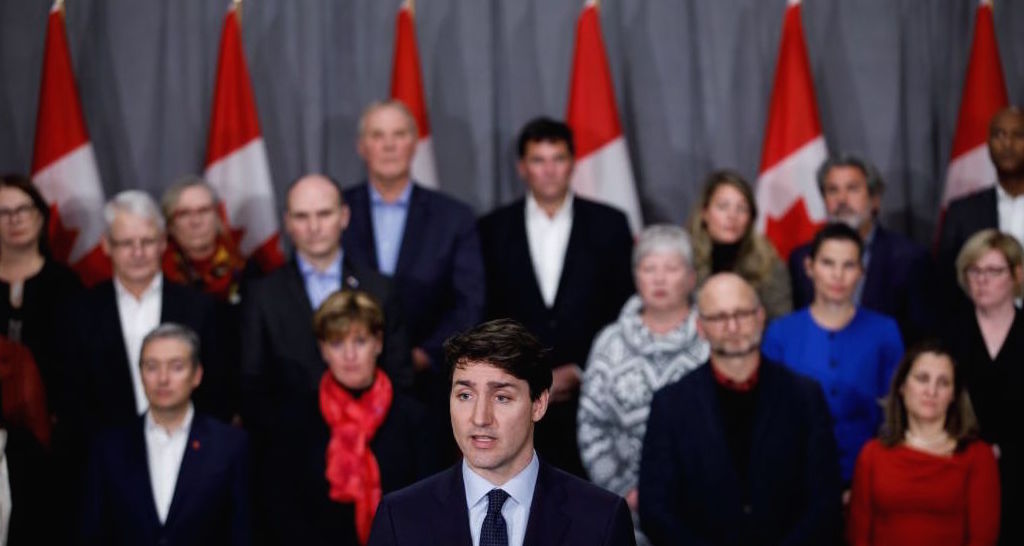The results of the October 21 election were straightforward. Canadians judged the Justin Trudeau Liberals disappointing, and denied them a second majority government.
On three big issues that any federal government faces, the Trudeau government was weak: it neglected official languages questions; misplayed Canada-U.S. relations; and bungled federal-provincial relations.
Official languages legislation is over 50 years old and needs to be updated. The Trudeau Liberals have said little — and done less — to promote better relations between anglophone and francophone communities.
When the mayor of Ottawa decided the national capital had no need to be officially bilingual, the federal government looked the other way. New Brunswick, the only officially bilingual province, elected an outspoken anti-French government, and the federal Liberal government had no response.
Charter-protected minority language rights are routinely denied by provincial governments. Currently the B.C. government is before the courts fighting its francophone community over providing services guaranteed under the Constitution.
The Trudeau Liberals did step in to partially fund a French-language university in Ontario … but the Ontario Conservatives still made French-language services a prime target for spending reductions.
French-language education has been driven by volunteer network Canadian Parents for French without enough support from Ottawa. The widely prized French-immersion education system is under-funded and under-staffed.
What should be a Canadian jewel — research and outreach to improve second-language instruction — gets short shrift from the Liberals. Language training for public servants was abandoned as part of the general austerity measures of the Chrétien years. The Liberals have made no plans to re-invest in second-language acquisition capacity, despite worldwide interest in the subject.
The election of Donald Trump panicked the prime minister’s office; the Trudeau PMO had prepared itself to welcome the election of Hilary Clinton.
For reasons never explained, the Trudeau people turned to former prime minister Brian Mulroney to advise them on how to deal with Trump. Mulroney was happy to oblige with a repeat of his favourite narrative: how personal friendship with the U.S. president meant so much to achieving Canadian goals (or would that be acquiescing to U.S. goals?).
The Trudeau people spent more time re-negotiating NAFTA than on any other issue and have nothing to show for it to date.
The Americans decided to bypass Canada and make a deal with Mexico, leaving Canada with no option but to bleat and cry to amend what had already been decided.
Currently the Trump administration is re-negotiating with Congress the deal the Trudeau cabinet assumed was already approved. Canada will have to accept whatever results from talks where it has no say — or else say no to a new NAFTA deal in which they are overly invested.
Decades of experience have shown that the best way to deal with the U.S. is in the company of other nations. In a one-on-one setting — which Americans prefer — the U.S. is able to exert its power and size advantage directly.
In a multilateral context, what Canada wants (say, access to the U.S. domestic market), other countries want. Importantly, what other countries gain, Canada receives as well — without having to give something extra to get it.
In return for granting trade concessions to others, the U.S. gets access to their markets while being constrained by the same undertakings it expects other nations to respect with regard to fair trade practices.
When the Canadian business class decided to opt for deep economic integration with the U.S. (misnaming it “free” trade) it convinced first Mulroney, then Chrétien, that was the way to go.
The biggest U.S. play was for energy. An excess of $300 billion was invested in the Alberta bitumen sands in order to supply the outsized demands of the American market for petroleum. Then the U.S. decided to frack oil and gas, and the bitumen boom went bust.
Now Trudeau faces Alberta and Saskatchewan, who are trying to blame Ottawa for the oil and price slump.
Resolving the growing federal-provincial conflict requires imagination: Canada needs a new economic strategy; fossil fuel extraction and export to a continental market are a dead end.
Trudeau and whoever he enlists to staff the PMO and his cabinet need to rethink the economic basics.
Well-being increases with income … up to a point.
Currently there are too many Canadians without enough income and others with more than they need. While Canadians with assets such as houses, stocks, and bonds, are doing well, citizens with low incomes cannot afford to pay the rent. Only government can right the imbalance in access to well-being through new income-support spending and wealth taxation.
The idea that more GDP is the solution is now being rejected — not just by Extinction Rebellion but also by hedge-fund managers and even the odd billionaire. When GDP growth eats the environment that supports life, the need for new measures of performance and a major policy reset can no longer be ignored.
Canada needs a central government committed to a new economic vision, one inspired by zero growth or de-growth, or more simply by ecological justice.
Duncan Cameron is president emeritus of rabble.ca and writes a weekly column on politics and current affairs.
Image: Adam Scotti/PMO




